Editor’s Note: The month of Ramadan begins on the 24th April, 2020, and it is a festival of community, family, and corporate prayers. In light of the COVID-19 pandemic, government agencies have called for restrictions on movement and social distancing. This week’s Thought Leadership Piece comes from journalist Misbahu L. Hamza, writing from Kano, which currently has the third highest number of confirmed COVID-19 cases in Nigeria. He highlights measures that some mosques have taken to ensure that the faithful stay safe during this time. He notes that Islamic leaders, in Kano and around the country, must advocate for safe practices during the Ramadan festival if public health agencies are to have any chance of containing the spread of the virus.
It was Friday, March 20, 2020, sun-scorched worshippers lined up the street of Alu Avenue through the barren Race Course Field in Nasarawa G.R.A, Kano State.
As the worshippers began to disperse after observing Jumu’a (Friday special prayers) led by Dr. Bashir Aliyu Umar, Chief Imam of Alfurqan Mosque, an announcement came through; “Henceforth, all Ta’aleem (study circles) in the mosque will be conducted remotely/virtually, so participants should follow and watch via the mosque’s YouTube and Facebook pages. This is so we can manage inflow of persons and avoid much contact in an effort to address the risk of contracting or spreading the coronavirus.” The mosque conducts three different Ta’aleem sessions on Fridays, Saturdays and Sundays. All sessions record a significant turnout of both men and women.
Alfurqan Mosque was neither the first nor only mosque to adopt this measure of curbing the spread of coronavirus among worshippers in Northern Nigeria; Usman Bin Affan Mosque in Gadon Kaya, Kano, also did the same.
On the same date Alfurqan adopted the precautionary measures, Annoor Mosque in Wuse 2, Abuja, also announced they would conduct their weekly Ta’aleem via Facebook Live. Dr Isa Ali Pantami is the Minister of Communications and Digital Economy in Nigeria and an Islamic Scholar delivering Ta’aleem on Sundays in Annoor Mosque. He took to his Facebook page to write, “In Islam, the protection of people’s lives is mandatory. The prophet directed us not to throw our lives into destruction. We can be held responsible before Allah if we fail to do our best in terminating the chain of transmission of the coronavirus”.
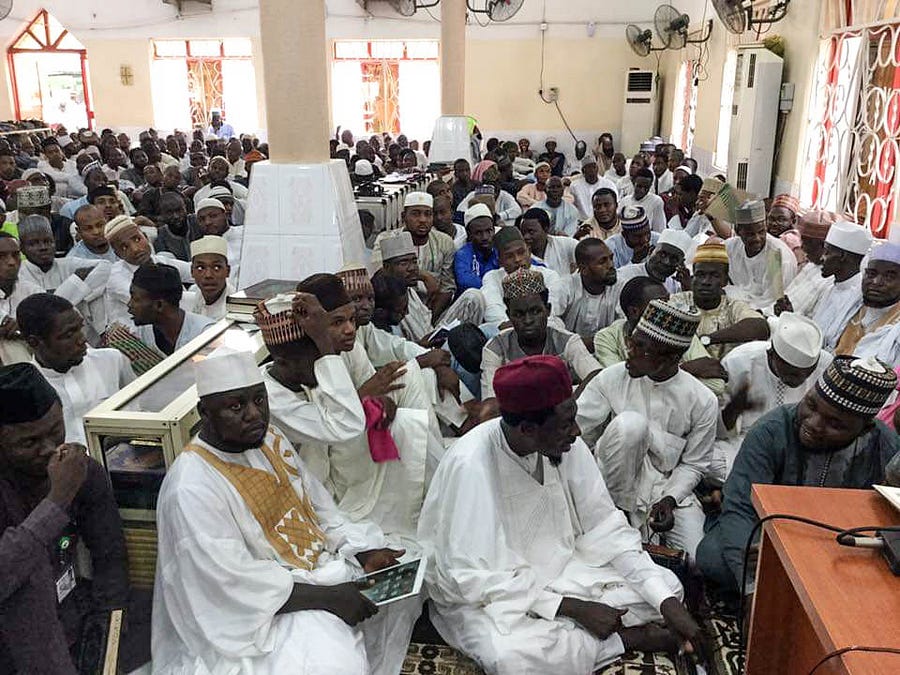
Interestingly, Alfurqan Mosque was proactive in suspending its Ta’aleem when there were no cases in Kano. The first coronavirus case in Kano State was recorded on April 11, 2020. The State entered a seven-day total lockdown on April 16, 2020, and today has recorded 73 confirmed cases of COVID-19, and 1 death, according to the State Ministry of Health.
When the lockdown order was pronounced by Kano State, Alfurqan Mosque and hundreds of other mosques across Kano complied, with the exception of a few, notably in Sumaila and Garko local governments. The State Police Command arrested the non-compliant Imams, as reported by Guarantee Radio 94.7 FM — a radio station in Kano State.
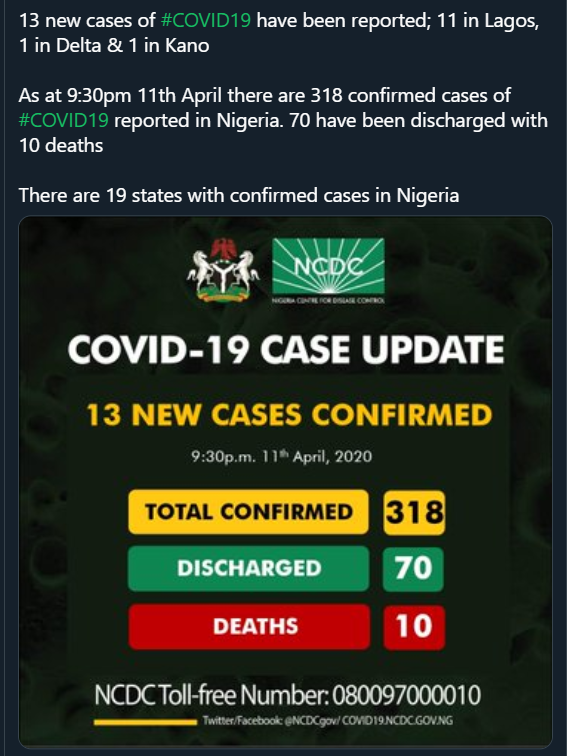
Does Kano have the capacity to contain the COVID-19 spread?
Kano has seen an alarming spread of cases of the virus in the past two weeks since the first case confirmed on April 12, 2020. Prof. Isa Sadiq Abubakar, Director, Center for Infectious Diseases Research BUK, said, however, that there is no cause for alarm with regards the newest cases recently recorded in Kano. “The new cases were confirmed positive from a highly suspected population who had contact with the previous case. Had the numbers been recorded from the general population without suspecting any case that is when you will be worried,” he said.
Kano State has one COVID-19 Test Centre at the Mallam Aminu Kano Teaching Hospital (AKTH) which was activated by Nigeria Centre for Diseases Control (NCDC) in early April 2020.
In a statement to newsmen on Monday, April 20, 2020, Hajiya Hauwa Muhammed, the Assistant Director, Information and Public Affairs of the AKTH, said the center has received and treated 300 samples since its inception.
Asked if having more testing centers in Kano will result to a higher number of cases, Prof. Isa Abubakar said, “It is more about the surveillance than the number of testing centers. Aside contact tracing, massive screening of the general population will also improve our reach and give a better picture of the situation.”
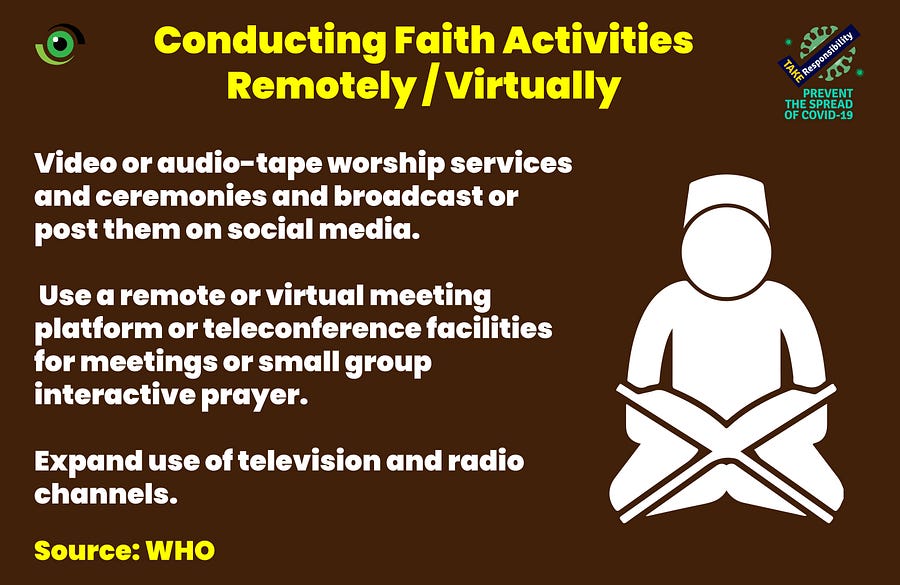
Religious Leaders key drivers of safe COVID-19 practices
As countries around the world implement measures to contain the spread of the novel coronavirus, religious leaders, institutions and places of worship, which are primarily sources of comfort and guidance, can join in promoting health and preventing the spread of the virus in their communities.
In March 2020, the Nigeria Supreme Council for Islamic Affairs (NSCIA), under the leadership of Alhaji Sa’ad Abubkar III, President-General of the Council and Sultan of Sokoto, directed the closure of all mosques in Abuja.
On April 20, 2020, the President-General also ordered the suspension of congregational supererogatory prayer (Taraweeh), the conduct of Qur’anic exegesis (Tafseer), and spiritual retreats (I’tikaf) in mosques across the country. Both statements urged Muslims to pray from home and join hands with governments to end the spread of the novel coronavirus.
The month of Ramadan begins in a few days, on Friday, April 24, 2020. When asked whether things would come back to normal, Mallam Yasir Ramadan Gwale, a committee member at Alfurqan Mosque said he is sure that even if the Kano State Government does not extend the lockdown order, Alfurqan will hardly re-open as usual.
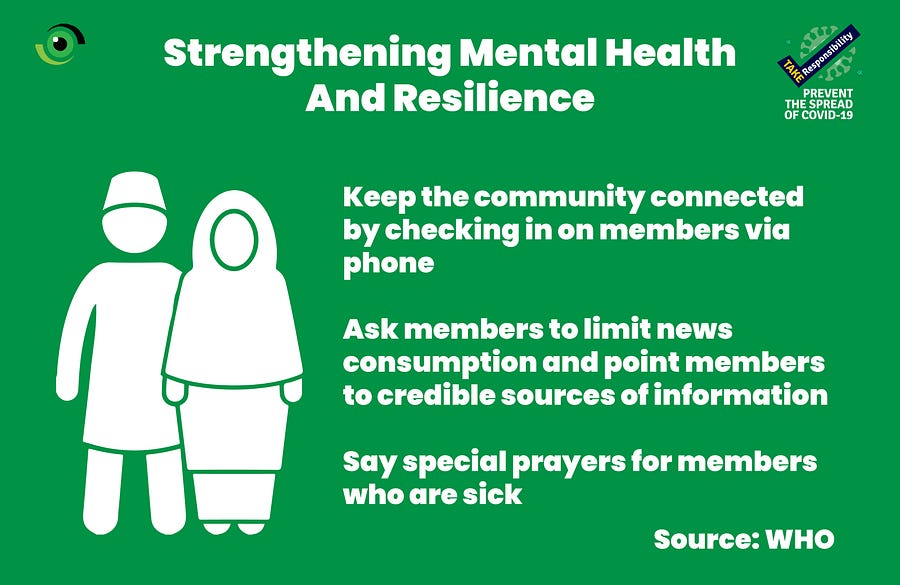
“But even if we open again,” said Mallam Gwale, “the Sultan, who is our spiritual leader in Nigeria already suspended Tarawee, Tafseer and I’itika. So, we may only be opening for daily congregational prayer. And in doing so, we will make sure we practice distancing within the mosque, hand washing and the use of face masks.”
Saudi Arabia’s Grand Mufti, the highest religious authority in the kingdom, Sheikh Abdulaziz al-Sheikh, said prayers during Ramadan and the subsequent Eid al-Fitr festival should be performed at home if the coronavirus outbreak continues.
In the holy month of Ramadan — the 9th month in the Lunar Calendar — Muslims across the world fast for the whole month, from dawn to sunset. The month is marked by religious gatherings where families and friends come together to break their fast after sunset (iftar) and eat before dawn (suhour). Remarkable also during the month is the increase in mosque attendance by the faithful to congregate for the five daily prayers, Taraweeh and other spiritual activities.
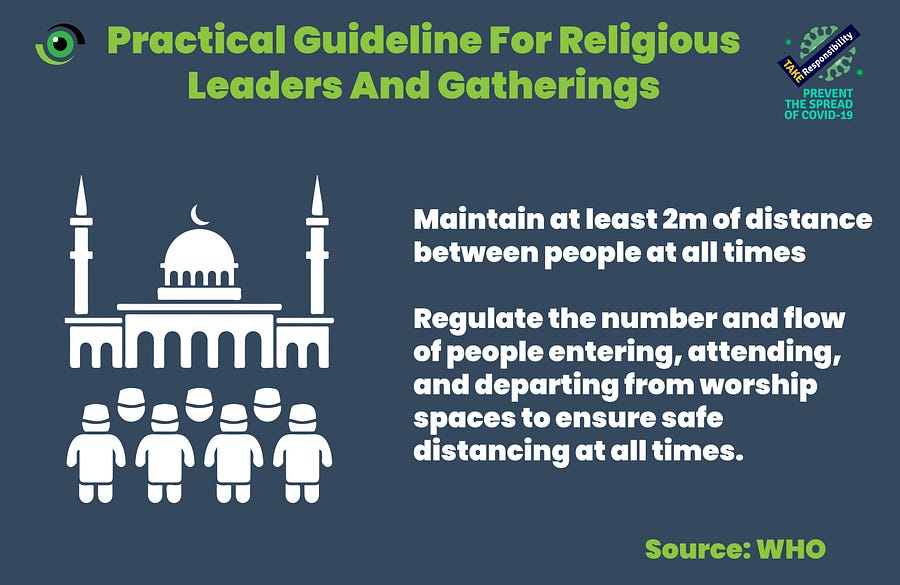
The call for safe practices during Ramadan
Health experts established that the transmission of COVID-19 disease is facilitated by close contact between people. Mosques are therefore vulnerable spots.
The World Health Organisation (WHO) has recommended guidelines for conducting prayers and other gatherings during Ramadan and Eid. These guidelines note that the States Ministry of Health and the Nigeria Centre for Disease Control (NCDC) should be the primary sources of information and advice about COVID-19.
Some of the guidelines under gatherings include;
- Maintain at least one meter (3 feet) of distance between people at all times
- Prevent contact between people
- Encourage healthy hygiene among worshippers
- Frequent hand washing
- Cleaning of sites and buildings
- Items that are frequently touched like kettles and taps, should be a priority
These are simple guidelines to implement in places where there is no restriction of movement.
What may however be safer given the easily transmittable nature of the coronavirus are the WHO recommendations for conducting faith-based activities remotely/virtually. These include; leveraging on-line channels, making video and audio-taped broadcasts of tafseer, and expanding the use of TV and radio channels. These channels should also offer low cost options so that many mosque committees can afford their services. As for Facebook Live, all the committees need are a smartphone and an internet connection.
The strategies leaders at various levels put in place to educate and prepare the faithful to safeguard themselves from the coronavirus in the coming weeks through the Ramadan period will count tremendously in Nigeria’s fight against the pandemic.
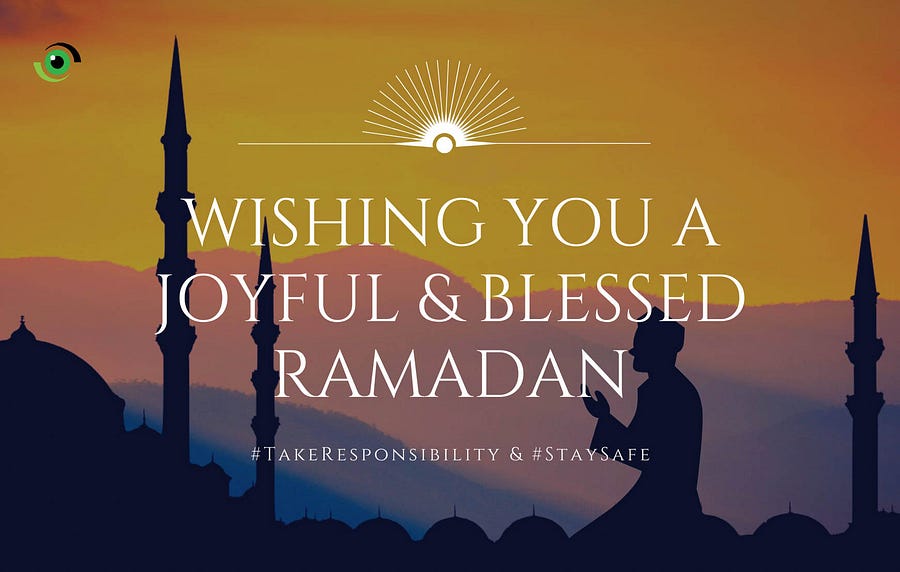
The actions of the NSCIA President-General and the leadership of Alfurqan Mosque, Usman Bin Affan Kano and Annoor Mosque, Abuja, is a call to other religious leaders to remember that they are important community role models for reinforcing these strategies and recommendations. Muslim communities can still maintain connection by conducting faith activities virtually, even if physically separated.
What is the mosque in your community doing to promote safety and social distancing during the month of Ramadan? Let us know in the comments section or on our social media platforms, @nighealthwatch on Twitter, and Nigeria Health Watch on Facebook.
Author’s Bio: Misbahu L. Hamza is a blogger, bibliophile and freelance journalist. He holds a bachelor’s degree in Statistics. He writes on Public Health, Maternal and Child Health and other pressing social issues. His articles have appeared on national dailies including Daily Trust and People’s Daily. He is the licensee and lead organizer of TEDxAminuKanoWay (@tedxaminukanoway). He tweets as @gambohamzer, and can be reached at misbahulhamza@gmail.com


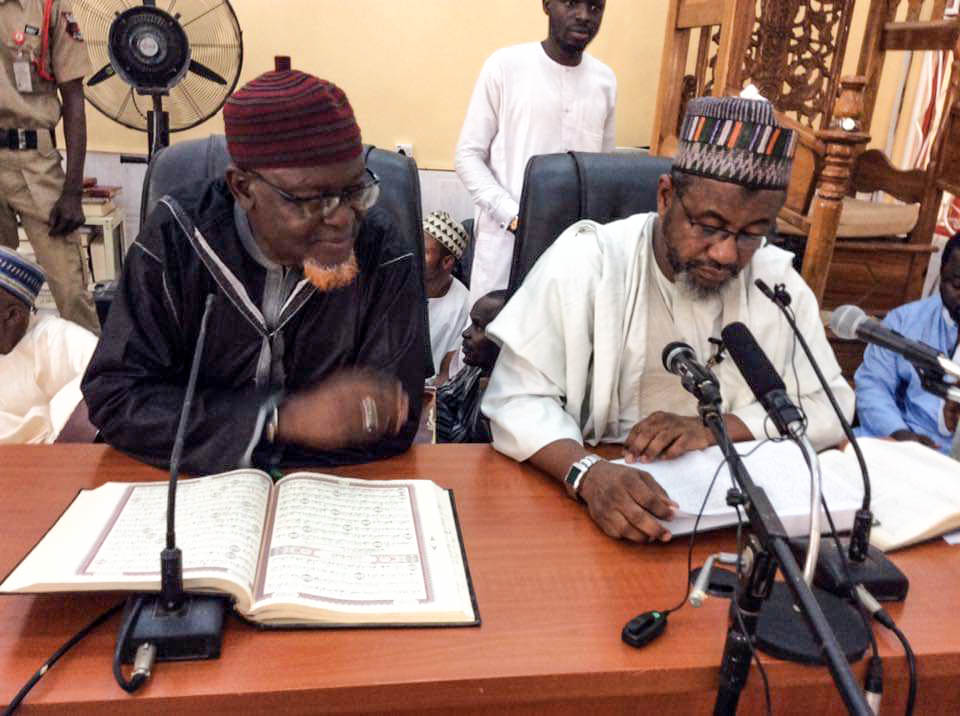
It’s being difficult to us here in GANGARE Community of Jos to avoid handshaking because of the Islamic indoctrination, hence people areas familiar or adhered to to that whenever they meet.
Mostly, people see’s those that avoids handshaking as idealists or having western inclination, this could be seen as a danger to the containment of the laurel CVID-19 pandemic.